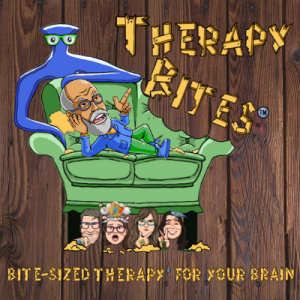
Thursday Nov 17, 2022
E11. Open Loops: The Psychology of NOT Knowing
OPEN LOOPS: The Psychology of NOT Knowing!
Audience: Fellow Clinicians & fellow strugglers with uncertainty, unanswered questions, and the unknown.
Psychotherapy Adventurers: Gamer Girl Heather, Super Bookworm Sarah, Squirrel Girl Debbie, & Doc Heath; lifelong anti-ignorance adventurer.
Go to https://TherapyBites.myshopify.com & grab some A.R.T. LAB MERCH, specially designed to help keep this episode’s message “top of mind” in your life! Don’t forget friends & family members who could use a mental boost too.
Show Summary:
In this episode . . .
How is YOUR level of “uncertainty avoidance”?
Do you catastrophize NOT KNOWING?
Are you ADDICTED to “cognitive closure”?
Do you let “lack of knowing” manufacture irritation, anger, fear, or anxiety?
TherapyBites Podcast is the home of A.R.T. LAB which investigates, explores, & educates all about the neuroscience of Accurate, Realistic Thoughts & Life Affirming Beliefs by challenging worn-out, unsubstantiated, ivory tower psychological theories as well as kool-aid drinking, pseudo-psychological social media clap-trap.
Today we venture into the deeper, darker recesses BENEATH the therapy couch to investigate one of the BIGGEST issues humans struggle with juggling and understanding: NOT KNOWING!
Humans are hard-wired to believe that open loops (i.e., unanswered questions, the unknown) are a risk or threat to safety. We believe LABELING things improves our understanding. Sometimes it does. However, these labels often do more to CONFUSE than explain scarcely understood phenomena. Death, for example, is a label that does little to improve our understanding of this particular human experience. It actually has become a word about which there are dozens of sabotaging cognitive distortions.
“Open loops” are psychological “itches” begging to be scratched. That’s completely normal. The key is to be careful in deciding in what cases “not knowing” is actually a threat to safety or security, life or limb.
During today’s episode, we explore some research-proven strategies for programming YOUR brain to deal with this MOST HUMAN of all experiences: NOT KNOWING.
Visit the TBAL Team at: https://therapybites.ac-page.com/team
CLICK BELOW FOR DAILY LIFE-AFFIRMING, PSYCHOLOGICALLY NUTRITIOUS INFO:
YouTube: https://www.youtube.com/channel/UC9Y8hab2i3m3YTqO9I7Rcjg
Instagram: https://www.instagram.com/doc.heath/
TikTok: https://www.tiktok.com/@therapy_bites
Twitter: https://twitter.com/therapy_bites
Tumblr: https://www.tumblr.com/therapy-bites
Pinterest: https://www.pinterest.com/Therapy_Bites/
Facebook: https://www.facebook.com/TherapyBitesPodcast/
(We love YOUR questions & comments on our social pages)
For more resources, visit:
https://therapybites.podbean.com/e/openloops
USEFUL REFERENCES:
Britton, J. C., Lissek, S., Grillon, C., Norcross, M. A., & Pine, D. S. (2011). Development of anxiety: the role of threat appraisal and fear learning. Depression and anxiety, 28(1), 5-17.
Hohman, Z.P. and Hogg, M.A. (2011), Fear and uncertainty in the face of death: The role of life after death in group identification. Eur. J. Soc. Psychol., 41: 751-760. https://doi.org/10.1002/ejsp.818
Jung, J.M. and Kellaris, J.J. (2004), Cross-national differences in proneness to scarcity effects: The moderating roles of familiarity, uncertainty avoidance, and need for cognitive closure. Psychology & Marketing, 21: 739-753. https://doi.org/10.1002/mar.20027
Sarinopoulos, I., Grupe, D. W., Mackiewicz, K. L., Herrington, J. D., Lor, M., Steege, E. E., & Nitschke, J. B. (2010). Uncertainty during anticipation modulates neural responses to aversion in human insula and amygdala. Cerebral cortex, 20(4), 929-940.
FOR OUR VORACIOUS READERS . . . GOBBLE UP THE WHOLE THING!!! (transcript): https://docs.google.com/document/d/12crfQaip90DKPZsGEILg3fDSoq0_7naPN7ub7_mnKVU/edit?usp=sharing